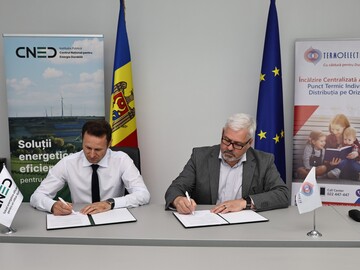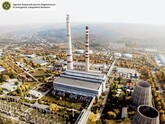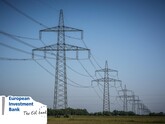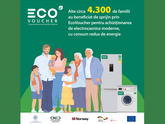
The National Center for Sustainable Energy and Termoelectrica will join forces to modernize centralized heating systems in Chisinau
Specifically, this includes a memorandum of understanding signed on June 30 to help implement energy efficiency measures in the residential sector, financed by the Moldova Residential Energy Efficiency Fund (FEERM). The agreement clearly sets out the technical and institutional responsibilities of both parties to accelerate the installation of individual heating units (IHUs). It aims to design, procure, and commission IHUs and horizontal distribution networks for heating and hot water supply in multi-apartment buildings connected to a centralized heating system. "Our cooperation with Termoelectrica creates the necessary framework for energy efficiency investments to be made quickly, correctly, and with real benefits for people. Through this partnership, we ensure that technical and institutional processes are aligned and that each stage, from design to commissioning, is effectively coordinated. This is a concrete step towards a modern, safe, and environmentally friendly urban heating system that meets the real needs of residents and contributes to achieving national energy transition and sustainability goals," said Ion Muntean, Director of the National Center for Sustainable Energy. According to him, this partnership aims to optimize technical interventions and remove administrative obstacles that could delay the implementation of energy efficiency measures, and will create a coordinated operational mechanism designed to ensure: the coordination of institutional processes, clarification of responsibilities, synchronization of implementation stages, and increased transparency in the implementation of public investments. In turn, Termoelectrica CEO Iurie Razlovan noted that the company strives to maintain a competitive and sustainable energy sector integrated into European energy markets in order to guarantee accessibility for consumers and strengthen the country's energy security. According to him, this joint initiative with the National Center for Sustainable Energy will improve the energy efficiency of residential buildings, allowing consumers to individually regulate the temperature in their apartments and enjoy greater thermal comfort. "When we talk about individual heat distribution units, we mean a system that takes heat energy from our main networks in a controlled manner. Using automation, it distributes this energy evenly and efficiently throughout the home. Another advantage of heat distribution units is automatic consumption control. As a result, heat supply is reduced, which saves energy. At the same time, in buildings where heat energy is distributed horizontally, heat consumption in apartments is paid for according to individual meter readings, which optimizes heat transfer and reduces losses. Ultimately, this project will benefit our consumers," said Iurie Razlovan. According to him, the partnership between the National Center for Sustainable Energy and Termoelectrica will bring direct and tangible benefits to residents of apartment buildings in Chisinau. First of all, the work will be planned and carried out in a coordinated manner, which will avoid delays and fragmented interventions that affect everyday comfort. Thanks to the installation of individual heat distribution points and horizontal distribution networks, energy losses will be reduced and thermal comfort in homes will be significantly improved. At the same time, residents will have access to clear information and technical support in the decision-making process, which will encourage the active participation of homeowners' associations. "This initiative demonstrates how public partnerships can generate structural change with a positive impact on urban communities, as well as contribute to reducing environmental impact and improving energy efficiency at the local level. This is a clear example of results-oriented institutional cooperation that puts the benefits for citizens and sustainable urban development at the forefront," noted the National Center for Sustainable Energy. // 30.06.2025 — InfoMarket







